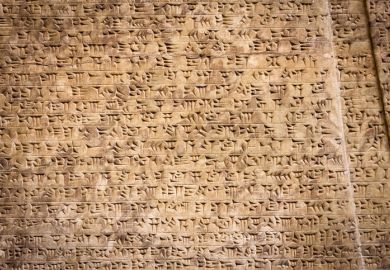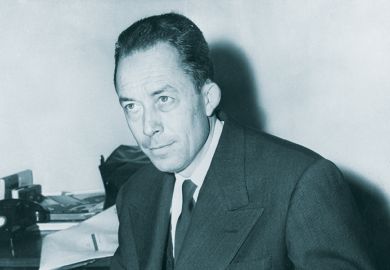In January 1593, the Earl of Essex took the opportunity of a shared coach ride with Sir Robert Cecil to impress upon Sir Robert that he intended to procure the post of Queen Elizabeth's attorney general (a post for which he knew Sir Robert was also a contender) for his protege Francis Bacon: "For the Attorneyship for Francis is that I must have, and in that will I spend all my power, mine authority, and amity and with tooth and nails defend and procure the same for him against whomsoever." Essex failed, and the job went to the more powerfully supported Edward Coke. But Bacon remained Essex's close and devoted follower and friend. After Essex's final disgrace and execution, Bacon penned an apology on his behalf, describing the earl's personal charisma and the intensity of his own relationship with the queen's ex-favourite during the 1590s. Employed, with his brother Anthony, as part of Essex's intimate household, he had devoted himself to pursuing the earl's interests to the exclusion of all other occupations: "Neglecting the Queen's service, mine own fortune, and in a sort my vocation, I did nothing but advise and ruminate with myself to the best of my understanding, propositions and memorials of anything that might concern his Lordship's honour, fortune, or service."
Glimpses like this reveal Francis Bacon as an intensely engaged and passionate man, caught up in the most sensational events of his age. It is sad, then, that so many of the books on Bacon that continue to roll off our academic presses present him as so curiously bloodless. The loss is not simply Bacon's; it is also the reader's. Contemporary readers have become accustomed to the liveliness which today's interdisciplinary studies has restored to studies of the life and thought of the past. The bloodless Bacon belongs to an early 20th-century version of intellectual history, which preferred to separate the man from his works. Who would guess, from the volumes of learned articles on Bacon's science and political thought, of carefully selected extracts from his prolific writings, or of freshly excavated, lovingly reconstructed fragments, that here was a man at the very centre of Elizabethan and Jacobean realpolitik, with a colourful personal life, and a finger in almost every contemporary policy-making pie?
One reason for scholarly evasion when it comes to Bacon's life (as opposed to his thought) is the not-so-small matter of his occasional political cowardice, betrayal of friendship and accusations of misconduct which led to his political disgrace. Most 20th-century intellectual historians of the period have preferred to separate the exemplary intellectual endeavours from the shabby behaviour. Even better was to prove such slurs were wicked lies, perpetrated by Bacon's enemies. Ever since Macaulay definitively blackened Bacon's personal reputation in an essay in the Edinburgh Review in 1837, one entire sector of the community of Bacon scholars has devoted itself to clearing his name. These are the so-called Baconians, among whom the name of Delia Bacon (a distant mid-19th century relative) figures most memorably and eccentrically. The devotion of the Baconians to the career and reputation of Francis Bacon borders on the deluded, and has included a persistent tendency to identify him as an illegitimate child of Queen Elizabeth I, or as the author of the entire oeuvre of William Shakespeare, or preferably both. Delia Bacon was encouraged to find encrypted messages in Bacon's work testifying to his activities as playwright, monarch-in-waiting or Elizabethan master spy by no less a cryptographer than Samuel Morse (of the Morse code).
Nieves Mathews, in her Francis Bacon: The History of a Character Assassination, is the latest to excavate the supposed secrets of Bacon's life, and to take up cudgels on his behalf to exonerate him from blame for the three key misdemeanours in his career. Perhaps predictably, the effect of her 600 pages of head-on confrontation with Bacon's detractors has the opposite effect. We are reminded (in sometimes interminable detail) of precisely which eminent scholar or critic accused Bacon of precisely which heinous crimes. Mathews's own attempts at "setting the record straight" in Bacon's defence get buried under the weight of contrary evidence, and particularly under the weight of the literary eloquence of the distinguished roll-call of those from Alexander Pope onwards who have been fascinated with the mismatch between Bacon's supposedly flawed temperament and the perfection of the philosophical works.
Francis Bacon: The History of a Character Assassination is a personal quest on the part of the author to rescue a wronged hero. It is not a contribution to the growing body of interesting new historical and textual material which assiduous Bacon scholarship is currently uncovering. A note to Mathews's bibliography makes explicit the fact that hers is a synoptic work, and that she did not attempt to consult primary sources: "Since the published sources for the period are plentiful, it was not generally found necessary to resort to unpublished material."
Brian Vickers's Francis Bacon: A Critical Edition of the Major Works, in the Oxford Authors series, also relies largely on existing published material. The standard edition of Bacon's works remains the seven-volume The Philosophical, Literary, and Professional Works of Francis Bacon, undertaken by James Spedding as his personal homage to Bacon, and edited by Spedding, R. L. Ellis and D. D. Heath between 1857 and 1874. From these volumes Vickers has put together a useful collection of literary pieces, ranging from the best-known of Bacon's writings - The Advancement of Learning and Essays - to "devices" designed as entertainments at Gray's Inn and letters of intellectual advice addressed to figures like Fulke Greville and the Earl of Rutland. As a teaching aid in an English literature classroom - where Bacon still figures as a "canonical" literary author - this is a volume well worth having. Vickers's explanatory notes (tucked away with the textual annotations at the end of the volume) are full and helpful. Since, however, the jacket promises "A critical edition of the major works" it is a pity that no scientific pieces whatsoever are included. The newly complete version of "Of tribute", impeccably transcribed and annotated by Henry Woudhuysen, is also rather lost among more familiar pieces. Like so many books devoted to Bacon's works, this volume appears to have begun as an ambitiously comprehensive compilation and then been trimmed to a more limited classroom edition. But it includes a good succinct chronology, and a spirited introduction pitched convincingly at the modern undergraduate.
The absence of Bacon's scientific writings from the Vickers volume underlines the persisting tendency to divide Bacon into "Bacon scientist" and "Bacon literary gentleman" - a shame, since no such distinction would have occurred to the man himself. The first published volume of the ambitious new complete works of Bacon, the Oxford Francis Bacon, consists of philosophical and scientific fragments of Bacon's writings for the period c1611 to 1619. It thus tends to confirm the Jekyll and Hyde Francis Bacon, since here is a writer unrecognisable from Vickers's volume, with a meticulous and detailed preoccupation with natural philosophy and practical science. I have to declare an interest in The Oxford Francis Bacon, as one of its two general editors. The present volume - volume VI - which consists of works not included, or incompletely included in the Spedding, Ellis and Heath standard edition, has been completed under the guidance of Graham Rees. It is an invaluable addition for those with an interest in the emergence of modern science, as well as in Bacon's work per se. The volume is also significant at a scholarly level, since Rees and OUP's Frances Whistler have established a set of textual conventions (including bracket types and varied fonts) which allows the reader relatively effortless access to the texts in various states and versions. With this first volume Rees and OUP have set a standard of scholarly rigour, expert comment and accurate English in the translation (with the help of Michael Edwards) which bodes well for the whole edition.
Rees also contributes an essay on "Bacon's speculative philosophy" to Markku Peltonen's Cambridge Companion to Bacon. Like Vickers's Oxford offering, this Cambridge Bacon is aimed at students. This, however, is a collection of secondary pieces which sets out to capture the versatility of Bacon's thought. Peltonen has rounded up a delegation of distinguished scholars, each of whom has made an original contribution to Bacon studies in the past, from Paolo Rossi, whose From Magic to Science set the tone of much recent history-of-science writing on Bacon, to John Channing Briggs, whose Francis Bacon and the Rhetoric of Nature is one of the most perceptive books of the past 20 years on Bacon's creativity. Unfortunately, the brief for the present volume was an apparently magisterial exposition of the current state of a series of "aspects" of Bacon studies, and contributors who generally write with sparkle and flair here fail to shine. In spite of a wealth of information, the Cambridge Companion is dull, both in style and content, and I must say that I would hesitate to recommend it to students, who are all too ready to find Bacon's own writing indigestible.
Here, in place of Bacon's own vision, wit and eloquence, we have carefully unremarkable explanations in uniformly leaden prose. Which is a bit hard on the man whose essay "Of studies" opens with a reminder that pleasure is a chief purpose of study: "Studies serve for delight, for ornament, and for ability." There is not much delight in evidence in the Cambridge Companion.
The great thinker would surely have grieved at such a state of affairs. By the end of his life, Francis Bacon, Baron Verulam and Viscount St Alban, was so heavily in debt that the distribution of his worldly goods in his last will and testament was a mere formality - he already knew that anything of value which still belonged to him would go straight to his creditors. Last in the family line, without an heir to carry his name or his title, his cherished hope was that at least his intellectual legacy would endure beyond the grave. "I would have the charge of my funeral not to exceed three hundred pounds at the most," he wrote in his will. "For my name and memory, I leave it to men's charitable speeches, and to foreign nations, and the next ages."
The diversity and range of Bacon's writings, their originality and ground-breaking redefinition of the terms of reference of European intellectual inquiry have earned him a permanent place in the western intellectual tradition. His ardent commitment to the great political figures he followed, and his total dedication to Elizabethan and Jacobean public service, the tireless work he did in legal matters and the framing of policy, made a lasting contribution to constitutional matters and affairs of state in this country. His flamboyant private life, now finally being recovered from evasions in the secondary literature, is the stuff romantic novels are made of. He deserves monuments as grand and as lasting as the figure he himself cuts in English history.
Lisa Jardine is professor of English, Queen Mary and Westfield, University of London.
Francis Bacon: A Critical Edition of the Major Works
Editor - Brian Vickers
ISBN - 0 19 282025 7
Publisher - Oxford University Press
Price - £13.99
Pages - 813
Register to continue
Why register?
- Registration is free and only takes a moment
- Once registered, you can read 3 articles a month
- Sign up for our newsletter
Subscribe
Or subscribe for unlimited access to:
- Unlimited access to news, views, insights & reviews
- Digital editions
- Digital access to THE’s university and college rankings analysis
Already registered or a current subscriber? Login



